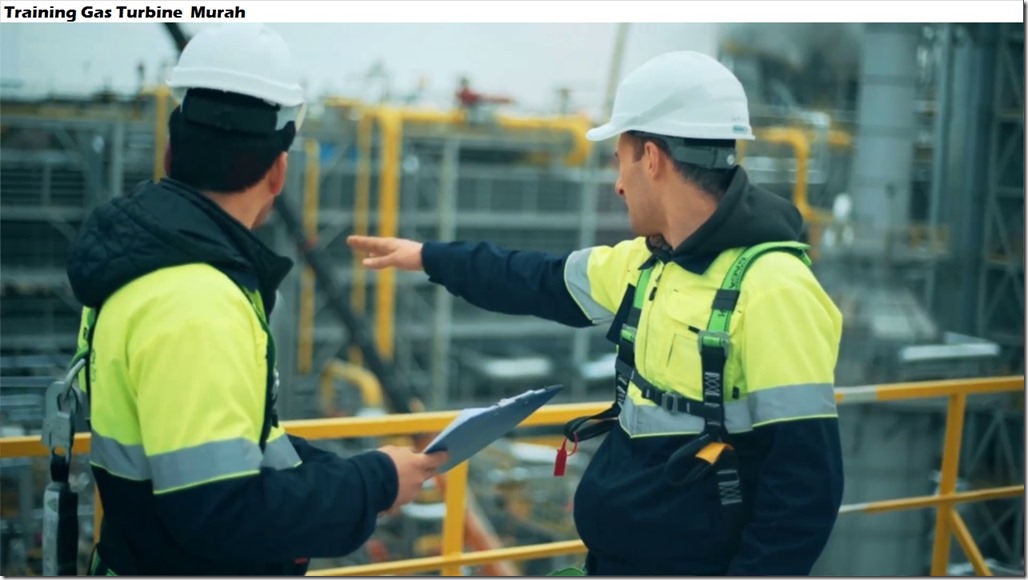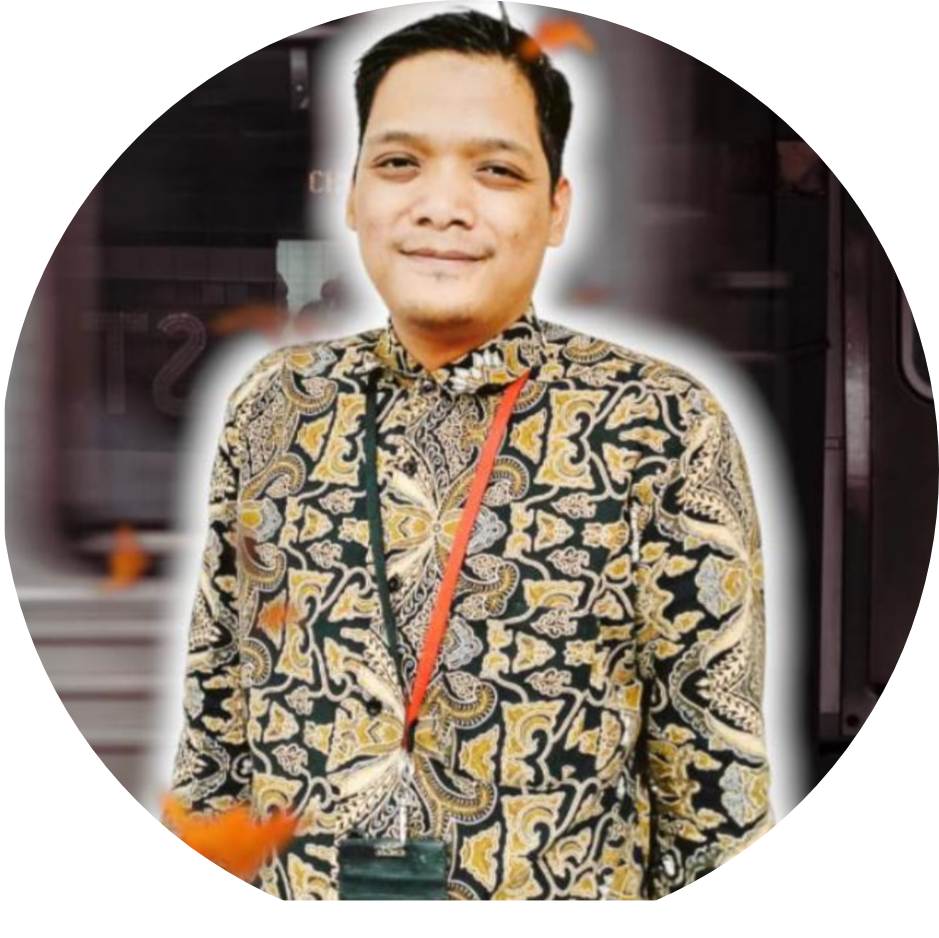
TRAINING GAS TURBINE
TRAINING GAS TURBINE
Training Operation Of Gas Turbine
Training Maintenance, And Trouble Shooting Of Gas Turbine

PENDAHULUAN :
A gas turbine extracts energy from a flow of hot gas produced by combustion of gas or fuel oil in a stream of compressed air. It has an upstream air compressor (radial or axial flow) mechanically coupled to a downstream turbine and a combustion chamber in between. “Gas turbine” may also refer to just the turbine element.
Energy is released when compressed air is mixed with fuel and ignited in the combustor. The resulting gases are directed over the turbine’s blades, spinning the turbine, and mechanically powering the compressor. Finally, the gases are passed through a nozzle, generating additional thrust by accelerating the hot exhaust gases by expansion back to atmospheric pressure.
Energy is extracted in the form of shaft power, compressed air and thrust, in any combination, and used to power aircraft, trains, ships, electrical generators, and even tanks.
To support the sufficient production system, we need tough worker or increase the worker skill of operation, maintenance, and trouble shooting of gas turbine profession.
PARTICIPANTS
Practitioner in the operator level, supervisor level or planner of machine maintenance technology at engineering industry, which at least senior high school or technical vocational school.
OBJECTIVE TRAINING :
To able know to operation, maintenance, and trouble shooting of gas turbine.
GAS TURBINE MATERIAL OUTLINE:
1. Overview of Gas Turbine Technology and Applications
Simple cycle Gas Turbines; cycle considerations; applications; fuels and corrosion; emissions; combined cycle and cogeneration. Overview of Developments
High temperature turbines, reheat turbines, close cycles, and other developments.
2. Rotating Components and Matching
Brief overview of compressor and turbine design; component characteristics and matching. Compressor surge and prevention.
3. Vibration and Rotor Dynamics
A review of vibration will include specific problems such as Blade Vibration and Shaft Critical Speeds. Case histories will link vibration with the fatigue failure of components. Rotor instability, in its various forms, will be discussed. Vibration spectrum analysis will be utilised for the solution of resonance, instability, and gear and blade problems. Campbell (Spoke) diagrams and Critical Speed maps will be derived and used for the solution of vibration and Rotor Dynamic problems. The design and performance of Squeeze-Film Damper Bearings for overcoming many of the problems associated with machine unbalance and critical speeds, will be covered.
4. Combustors and Fuels
A description of combustor types, chamber design, fuel atomisation, ignition and combustor arrangements will be presented. Also discussed will be the constraints imposed by fuels on the design and operation of the hardware. The wide spectrum of fuels, both gaseous and liquid, is examined. An overview of fuel treatment and additives will be made.
5. Performance Analysis
Basic thermodynamic aspects of stationary Gas Turbines. Design and off-design operation. Influence of site effects on typical performance maps. Variable geometry compressor and turbine status.
6. Performance Analysis for Problem Detection
The fundamental concepts of performance analysis as a tool for saving energy costs are discussed. Basic and applied thermodynamics will be reviewed for gas turbines. The use of performance data to pinpoint problem areas will be discussed. Diagnostics related to fouling, nozzle erosion, bowing surge, choke, etc. will be covered. Meaningful trending methods will also be discussed.
7. Gas Path Analysis for Stationary Gas Turbines – Status
Simulation of degraded Gas Turbines, derivation and application of fault coefficient matrix, fault trees and other techniques. Implications for component life and emissions.
8. Gas Turbine Fouling
The causes, effects and detection of fouling in axial compressors will be covered including aero thermodynamic effects, effects on surge margin, intake distortion and blading problems. Filtration and control techniques will be covered.
9. Gas Turbine Repair
The techniques of inspection and repair of gas turbines are described in detail, including NDT techniques, cleaning, plating, heat treatment, welding, etc.
10. Maintenance
Case histories of various types of failures and maintenance problems of onshore and offshore gas turbine compressor installations are discussed. Maintenance techniques using bore scope and spectrum analysis including acoustic monitoring are discussed. Techniques for checking and conducting repairs on impellers, diffusers, bearings, couplings, and foundation repair are emphasised.
11. Special Considerations for CHP Gas Turbines
This section will cover special considerations in design, operation and maintenance of turbines and associated equipment on Cogeneration Services. Several cases will be covered. Off design operation effects on HRSG, STTG Cycles and evaporate cooling will be covered.
TRAINING INSTRUCTOR
Maridjo,Ir. M.Sc.
Lokasi, Biaya, dan Waktu pelatihan :
Yogyakarta, Hotel Dafam Seturan
Jakarta, Hotel Amaris La Codefin Kemang
Bandung, Hotel Grand Serela Setiabudhi
Bali, Hotel Ibis Kuta
Lombok, Hotel Jayakarta
Catatan : Waktu pelatihan Dua+1* hari dengan Biaya tersedia untuk Perorangan, Group, dan Inhouse Training, belum termasuk akomodasi/penginapan.
Investasi training :
Investasi pelatihan selama dua hari tersebut menyesuaikan dengan jumlah peserta (on call). *Please feel free to contact us.
Apabila perusahaan membutuhkan paket in house training, anggaran investasi pelatihan dapat menyesuaikan dengan anggaran perusahaan.
Fasilitas training :
Free Penjemputan dari bandara ke hotel*.
Modul / Handout.
Flashdisk*.
Certificate of attendance.
FREE Bag or bagpacker.
Training Kit (Photo Documentation, Blocknote, ATK, etc).
2x Coffe Break & 1 Lunch.
Souvenir .
(Untuk informasi lebih lanjut harap menghubungi marketing kembali di 0812-9679-4263 an. Aryo Nugroho)

